

皆さん、こんにちは。私はハンガリーのカーロリ・ガーシュパールカルビン派大学から来ました。2018年10月から1年間福島大学に留学しています。
今年度はやっと日本語での授業のみ受けるようになりました。そして、一週間に2回中国語の授業もとっています。日本語以外の言語を日本語でとるのは初めてですが、とても楽しんでいます。
ゼミにも参加するようになりました。授業やフィールドワークは卒業論文の内容に関していますので、非常に役に立ちます。今までに2つのフィールドワークがありました。最初の国見町であったフィールドワークの際には太々神楽祭りに参加することがでました。神楽を初めて見ることだけではなく、地域の人々とも話すことができました。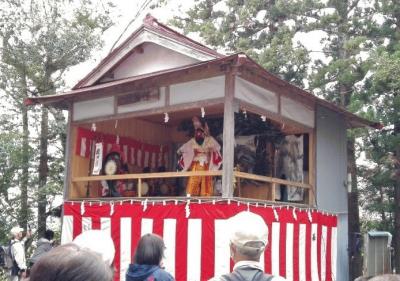
▲神楽
もう一つのフィールドワークは西会津の奥川地区にある限界集落で行われました。ほとんどの集落で高齢化率は50%を超えていますので、力仕事ができる人が少ないです。だから、大学生は毎年手伝いに来ます。ここで、水路から落ちてしまった葉や木を出すという作業をやりました。この仕事は、掃除した水路を通って田んぼまで川の水を流させるというものなので、とても重要です。この作業をしないとお米を栽培することができないということを勉強しました。山で囲まれた地域の家は殆どが古くて、私が泊まった一戸建ても約130年前に建てられた家でした。日本に来る前の目的の1つは、限界集落に住んでいる人たちと話すことだったので、60代の住民の方にたくさんいい話を聞かせてもらって嬉しかったです。
2月から5月の間は旅行などの体験がたくさんできて、とても良かったと思います。まず、2月9日に米沢の雪まつりを一人の福大生のおかげで見に行くことができました。以前のレポートには書いてないですが、福島大学の学生さんはとても優しくて、いつもどこかに誘ってくれたり、手伝いに来たりしてくれるのでとても感謝しています。
ハンガリーとその周りの国々にスキー場がありながら、ハンガリーに住んでいる間にはスキーをしなかったので、2月14日に人生で初めてスキーを体験しました。とても嬉しかったです。それから、2月17日には、相馬市でわくわくワールドフェスタが行われました。このイベントでは、自分作ったハンガリー料理を売って、ハンガリー料理の美味しさを日本人に伝えることができました。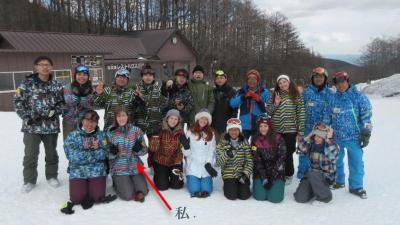
2月末には3日間のホームステイを体験して、とても楽しく有益な時間を過ごしました。あぶくま洞やアクアマリンふくしまを見に行った後、週末にお世話になるホームステイの家族と会いました。とても心が温かい家族でした。新地町での家に着いた時、おばあさんは美味しい晩ご飯を作ってくれて、一緒に食べながら話をしました。 その時に震災の話などを聞かせてもらいました。一番印象に残ったのは「家や全てのものが流されたけど、家族全員助かったので、よかった」という話でした。次の日は自分で作ったそばを食べて、おしゃべりしながら山に登りました。この週末で日本での家族ができたと思います。おばあさんは私のお祖母さんを、おじいさんは今年の1月に亡くなってしまった私のお祖父さんを思い出させました。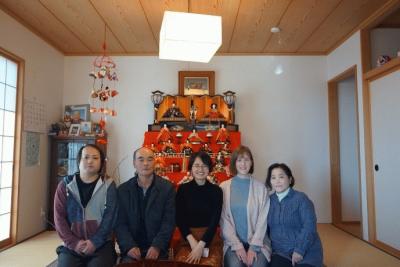
九州をはじめ東京など様々な場所へ旅行に行きました。日本に来る前の夢の一つは花見することでしたので、写真で見たような綺麗な満開の桜をたくさん見ることが出来て良かったです。
8月末に留学生活が終わってしまいますが、福島での生活は一生忘れません。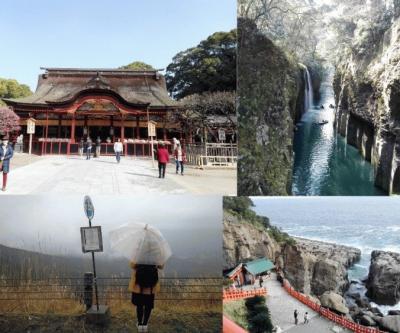
▲九州旅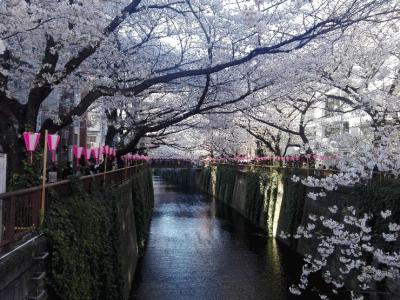
▲目黒川の桜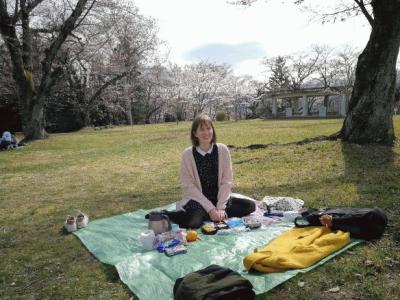
▲福島の大森城山公園
Hello! I came from Károli Gáspár University of the Reformed Church in Hungary. I have been studying at Fukushima University from October 2018, and I am studying here till the end of August 2019.
This year finally I reached to the level to only take classes held in Japanese. However, I also take Chinese classes twice a week. It is my first time to learn a language other than Japanese in Japanese, but it is a good challange and I am enjoying it.
I was able to participate in a seminar as well. The classes and the field works are very useful because they relate to the problem I write about in my graduation thesis. There have been two fieldworks so far. During my first field work that was in Kunimi-cho, I could participate in the Grand Kagura Festival. Not only I could see kagura dance for the first time, but also I could talk with the local people. Another field work was in one of the marginal villages of West-Aizu's Okugawa district. In these villages, the aging rate is over 50%, so there are few people who can do physical work. Therefore, university students come to help every year. I did the work of taking out the leaves and branches that had fallen into the water channel. This job is very important, because this is the water channel which helps water reach and flow in to the rice fields. I learned that one can not grow rice without it. Almost all the houses in the area surrounded by mountains were old, and the home I stayed at were also built about 130 years ago. One of my goals before coming to Japan was to talk to people living in these marginal villages, so I was really happy to hear stories from the elderly residents.
I was lucky enough to travel to quite a lot of places between February and May. First of all, I went to see the Yonezawa Snow Festival on February 9th thanks to one Fukushima University student. Although I did not write in the previous report, but the students at Fukushima University are very kind and I am always grateful that they invite us to different places. They also help a lot.
While there are skiing places in Hungary and in the surrounding countries, I haven't skiied while living in Hungary, so I am glad to be able to experience skiing for the first time in my life on the 14th in Fukushima. Thanks to the World Food Festival held in Soma city on the 17th, the Hungarian team could sell Hungarian food and with it, we could convey the deliciousness of Hungarian food to Japanese people.
At the end of February, I participated in a 3-day homestay programme, where I spent a very enjoyable and useful time. After we went to see the Abukuma Cave and Aquamarine Fukushima, we met our homestay family. It was a very warm and loving family. When me and another student arrived to the family's house in Shinchi town, the grandmother made a delicious dinner and we talked freely while eating together. I could also hear stories about the 2011 disaster, as the family has experienced it..."Our house and everything was washed away, but we are glad because the whole family survived."- this is the sentence I won't be able to forget till the rest of my life. I learned a lot. The next day, we ate the soba we made ourselves and climbed a mountain while chatting. I think I made a family in Japan that weekend. The grandmother reminded me of my own grandmother, and the grandfather reminded me of my own grandfather who died in January of this year.
I could travel to various places such as Kyushu and Tokyo. One of my dreams before coming to Japan was to „hanami" or see the beautiful cherry trees in full blossom. I am saying goodbye with these pictures I took in Kyushu, Tokyo and finally in my beloved Fukushima.